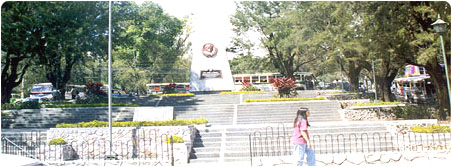Rizal
Park Baguio

Between Burnham Park and the City Hall of
Baguio is a rectangular piece of city property known as Rizal
Park. The park was erected in honor of Dr. Jose P. Rizal,
the national hero of the Philippines and is similar to numerous
other parks that are found in towns and cities all over the
Philippines which are also named in his honor. It is on this
site that the annual celebration honoring Rizal every 30th
of December is held.
Rizal is said to be one of the greatest Filipinos
who ever lived. At a time when the Philippines was under the
oppressive rule of the Spaniards who came to colonize the
country, Rizal's brilliance and dedication to his country
served as inspiration for the Filipinos to fight for their
independence. Rizal was a believer in the potential of the
Filipino to seek the greatest heights amid adversity, and
he lived a life that proved this.
Rizal was an academician, a linguist, historian,
writer, a scientist, and a medical doctor. He wrote a book
titled "Noli Me Tangere" where he depicted the condition
Filipinos were living in under the hostile and oppressive
rule of the Spanish friars. His books were banned by the Spanish
friars in the country at that time since it sought to expose
their corruption and greed. Rizal’s second novel was
the "El Filibusterismo" which was the sequel to
his first book and where he clarified his political ideas.
Dr. Rizal had thoughts of eventual independence
for his country. He was a believer in non-violent resistance
even before India’s Mahatma Gandhi made it fashionable.
He refused to endorse an armed uprising against Spain, fearing
that the poorly equipped Filipino revolutionaries would be
slaughtered. Instead he believed that quality education held
the key to the liberation of his beloved land.
It does sound ironic that the revolution
which started in his lifetime was attributed by the Spaniards
to Rizal although he never had a hand in it. He was falsely
accused as the supreme leader of the "Katipunan"
which was looked upon by the Spaniards as an illegal and subversive
organization at that time. The Spanish military court found
Rizal guilty of rebellion and sedition and was executed by
a firing squad in Bagungbayan Field (Luneta Park) on December
30, 1896. Rizal's execution served as an inspiration to his
compatriots and fueled the Philippine revolution, telling
the world that here was a people yearning to be free.